Christina Thompson: Sea People: The Puzzle of Polynesia
January 14, 2020 by David
Filed under Non-Fiction, WritersCast
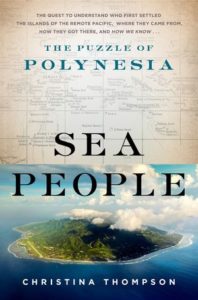 Sea People: The Puzzle of Polynesia – Christina Thompson – 9780062060877 – Harper – Hardcover – 384 pages – $29.99 – March 12, 2019 – ebook editions also available at lower prices, varying by outlet.
Sea People: The Puzzle of Polynesia – Christina Thompson – 9780062060877 – Harper – Hardcover – 384 pages – $29.99 – March 12, 2019 – ebook editions also available at lower prices, varying by outlet.
“I loved this book. I found Sea People the most intelligent, empathic, engaging, wide-ranging, informative, and authoritative treatment of Polynesian mysteries that I have ever read. Christina Thompson’s gorgeous writing arises from a deep well of research and succeeds in conjuring a lost world.”
– Dava Sobel, bestselling author of Longitude and The Glass Universe
I completely agree with Dava Sobel. This is an incredible book, probably the best introduction to the ancient and modern world of the Polynesian people of the Pacific islands you could ever read. She starts with an anecdote of modern Polynesia that aptly sets the scene for the entire story. Thompson is married to a Maori (her first book, Come on Shore and We Will Kill and Eat You, tells the history of the Maori people of New Zealand, who are among the many groups of Polynesians). When she and her husband are in Hawaii about to rent a kayak, the Hawaiian managing the concession tells them it rents for “thirty dollars….but twenty for you, brother.” It’s a striking moment, giving Thompson the opportunity to explain the entire outline and genesis of the book. Polynesians all over the Pacific from New Zealand to Hawaii to the Easter Islands are related to one another. They all instantly recognize the cultural connection, and while many of the lifeways and life skills that existed hundreds or a thousand years ago have disappeared, and European and Asian influences have spread throughout the region, the ocean environment is what it always was. The mystery is, of course, how did the Polynesians navigate the open ocean for over 1000 years to populate the vast majority of the Pacific Ocean? Sea People tells that story brilliantly.
Through the course of this deftly written book, Thompson tells us how the earliest identifiable Polynesians settled this vast region. She explores what was once called the “Problem of Polynesian Origins” that fascinated the thinking of many European scientists during the late nineteenth century and into the modern era, where a variety of theories have competed to explain who the Polynesians are and how they got there (from the east or from the west, for example.)
This book is a comprehensive telling of history, geography, anthropology, and includes a great deal about the science of navigation. It’s a completely engrossing and riveting read, making it one of the more satisfying nonfiction books I have read in a long time.
Christina is a great person to talk to, so knowledgeable and comfortable with her material and never dry or pedantic in her approach to communicating so much of what she knows. It was a pleasure to speak with her for Writerscast.
My interview with Christina Thompson about her (wonderful) previous book, Come on Shore and We Will Kill and Eat You All can be found here on Writerscast, (originally posted in December, 2011.)
Christina’s author website is here.
The book is available for purchase from independent bookseller RJ Julia here.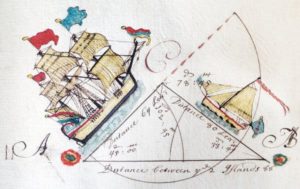
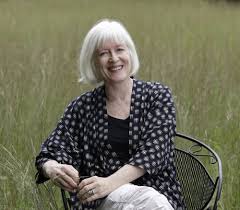
Podcast: Play in new window | Download
Christina Thompson: Come on Shore and We Will Kill and Eat You All
December 18, 2011 by David
Filed under Non-Fiction, WritersCast
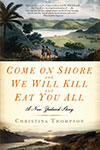 978-1596911277 – Bloomsbury USA – $15.00 – paperback (ebook editions available)
978-1596911277 – Bloomsbury USA – $15.00 – paperback (ebook editions available)
Christina Thompson’s Come on Shore and We Will Kill and Eat You All – A New Zealand Story gets one’s immediate attention for its outstanding title, of course. How could one resist? This tightly woven memoir was recommended to me by a writer friend who admires stylish writing and it certainly does offer some very fine writing.
But I was most drawn to it at the outset, because Ms. Thompson is an anthropologist, a field of study I have always loved. Early in her career, she lived and worked in Australia, and traveled to nearby Pacific islands, including New Zealand, where she met and eventually married a Maori, the point where this book really starts to take off.
The title of the book comes from a statement made by Maoris at an early meeting with some European explorers. It perfectly stands for the cultural gulf between the two peoples and the lack of understanding each had for the other’s entirely foreign culture. This theme of misunderstanding, and of culturally determined viewpoints, runs throughout the entire book. Because she is now directly connected to the Maori/Polynesian worldview by dint of marriage, and because she has an anthropologist’s ability to look beyond her own viewpoint, Thompson is able to navigate the intricacies of cross-cultural interaction better than most writers.
Thompson talks about her family, children, American and Maori relations as part of the effort to understand differences, and to explain behavior. It’s inevitable that Maori and Polynesian cultures are poorly understood in either Europe or America, where the author and her family now lives. In this memoir, author Thompson looks at the past and the present through the lens of contact and perception with a powerful incisiveness. Sometimes we are lulled by the commonplace story of the present, and then are shaken awake by its connections to a violent past. The historical Maoris were a violent and warlike people, and their collision with the equally violent (and self-centered) Europeans of the colonial imperial era created a long period of difficulty for the native people of New Zealand and surrounding regions of the Pacific.
This book is one I can recommend to anyone who wants to see beyond her or his own experience, to learn the limits of anyone’s personal perspective as it is part of a cultural construct, and to peek into the different ones that are around us in our now hyper-connected universe. Another fine book I am pleased to recommend. And I do think our conversation expands on the ideas that are present in the book.
Christina Thompson is the editor of Harvard Review. Her essays and articles have appeared in a number of magazines and journals, including Vogue, American Scholar, the Journal of Pacific History, Australian Literary Studies, and in the 1999, 2000, and 2006 editions of Best Australian Essays. She lives near Boston with her husband and three sons.You can read excerpts from this book, find some very interesting resources and learn more about the author and her work at www.comeonshore.com.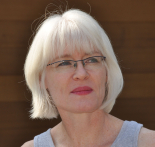
Podcast: Play in new window | Download
